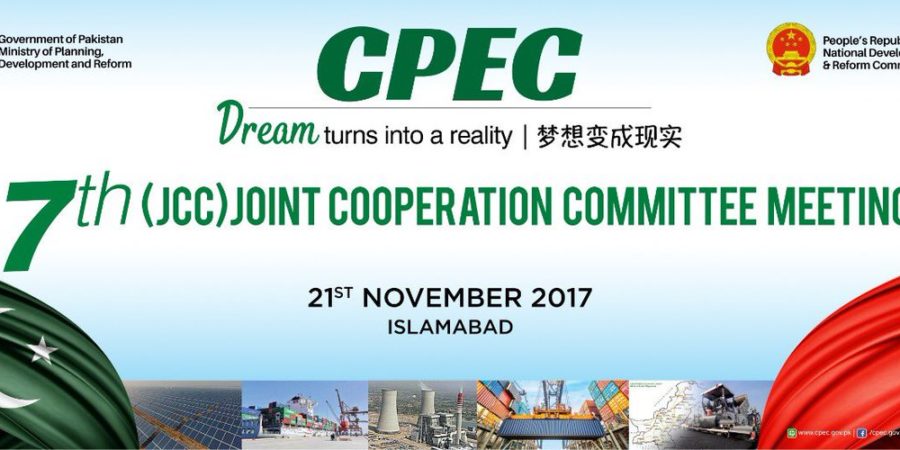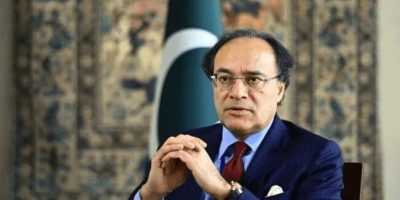CPEC: Provinces prepare for the 7th JCC meeting

ISLAMABAD, (DNA) – THE Punjab government is ready to pitch at least two under-construction industrial estates in the province for their inclusion in the list of the 27 priority special economic zones (SEZs) to be established across the country under the China-Pakistan Economic Corridor (CPEC).
The case for the two industrial estates in Faisalabad and Sheikhupura will be made at the seventh meeting of the Joint Cooperation Committee (JCC), scheduled to be held in Islamabad on Nov 20-21 to review progress on the projects already under way.
Punjab is said to be the largest beneficiary of the official and private Chinese investments being made under the CPEC project, especially in the energy and transport infrastructure.
Mujtaba Paracha, the provincial industries’ secretary, told this writer that Punjab has completed comprehensive feasibility reports regarding both the economic estates to be presented for their inclusion in the CPEC projects.
The development of the Faisalabad industrial estate was at an advanced stage, he said, and hoped that it would be added to the list of SEZs under the corridor initiative that will connect China’s western-most region with the rest of the world through the Gwadar deep-sea port.
The province has completed comprehensive feasibility reports regarding both Faisalabad and Sheikhupura estates to be presented in this JCC
The new SEZs will be owned, controlled and operated by the provinces. But the federal government hasn’t announced the framework under which these zones will operate and what kind of benefits will be available to the investors.
Local businessmen as well foreign companies operating in Pakistan fear that these zones are being created exclusively for Chinese companies where they will enjoy extensive tax and labour law exemptions, creating an uneven field for existing domestic and foreign firms.
The local businesses as well as foreign companies have long been demanding that the SEZs not exclude them.
The government has not yet come up with any explanation. In fact, the new apparel park along the Lahore-Islamabad motorway near Sheikhupura is expected to be exclusively for Chinese investors.
Mr Paracha said the Punjab government also planned to raise the concerns of the business community from Punjab about their share in the future industrial cooperation between the two nations, as work on the trade route and SEZs gains momentum. “We will convey the sentiments of our businessmen that these economic zones should not be exclusive to China, and investors from Pakistan as well as other countries should also be allowed to invest there.”
In addition to pitching the two industrial estates for inclusion in the SEZ list, Iftikhar Ali Sahu, Punjab’s planning and development department secretary, said projects like the Lahore-Multan motorway and Multan-Sukkur motorway would also be discussed on the first day of the meeting between officials of the two neighbouring countries.
The secretary said the projects related to tourism and agriculture will be taken up at a later stage “because other sectors are our main priority at the moment”.
A provincial agriculture department official confirmed that no project related to agriculture was on the table at present.
Punjab Industries, Commerce and Investment Minister Sheikh Allauddin said the province will also pitch Chunian, Vehari and Rahim Yar Khan industrial estates for inclusion in the CPEC. But he too expected only the industrial estate in Faisalabad to be included on the list of SEZs at this stage
“The [$1.65 billion] Lahore Orange Line Metro Train project was discussed at the last JCC meeting in China. The delay in the completion of the project [because of cases against it pending in the courts] may also be taken up in the next review,” Mr Sahu said.
He explained that the JCC met every six months to review the progress on the ongoing projects under the trade route initiative as well as to discuss new ones.
“On the first day, Pakistani government officials meet their counterparts and on the second day the political leadership of both the countries hold discussions,” he said.
The six-month review of CPEC projects is a regular feature and it would continue till 2030.
“We will have four working sessions to discuss in detail the progress on the projects in seven sectors: infrastructure, energy, transport, Gwadar, banking, tourism and agriculture,” he said.
“We have outlined long-term plans for 2030, mid-term for 2025 and short-term (for two to three years). While reviewing the progress made so far, the meeting will analyse sector-wise development. If there are delays in any project we try to address the issue on a top priority basis so that it doesn’t linger on for another six months,” he said.
Punjab Industries, Commerce and Investment Minister Sheikh Allauddin said the province will also pitch Chunian, Vehari and Rahim Yar Khan industrial estates for inclusion in the CPEC. But he too expected only the industrial estate in Faisalabad to be included on the list of SEZs at this stage.
Hassan Khawar, who has done extensive research on the CPEC, told this writer that the most important thing to be discussed at the next JCC meeting was the long-term CPEC plan. “In the previous meetings, the long-term CPEC plan was neither presented nor discussed. This time it will be signed and discussed by both parties. After that this document will be available to the public.”The long-term plan will actually reveal the direction of future bilateral cooperation between the two countries in the industrial and agriculture sectors.
Related News

Aurangzeb chairs meeting on regional energy situation
ISLAMABAD, MAR 4 /DNA/ – The Committee to Monitor Petrol Prices in the Wake ofRead More

Ambassador Varga highlights strong potential for bilateral trade growth
ISLAMABAD, MAR 4 /DNA/ – Ambassador of Hungary Dr. Zoltan Varga has said that HungaryRead More


Comments are Closed